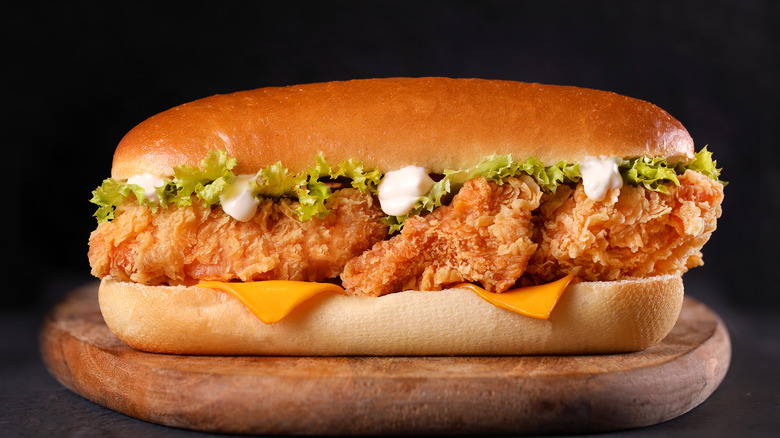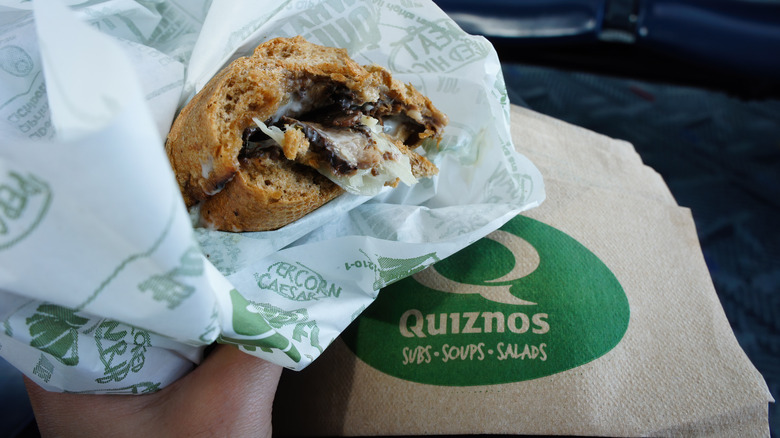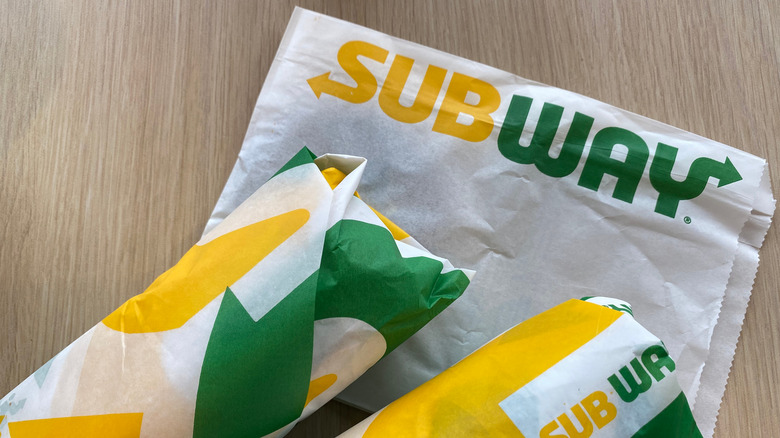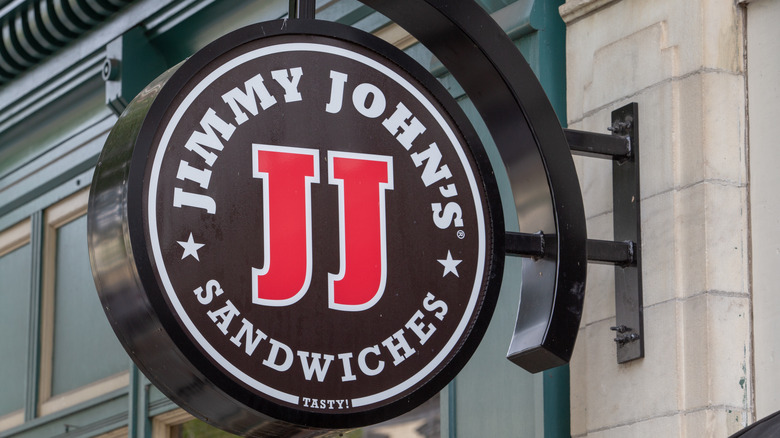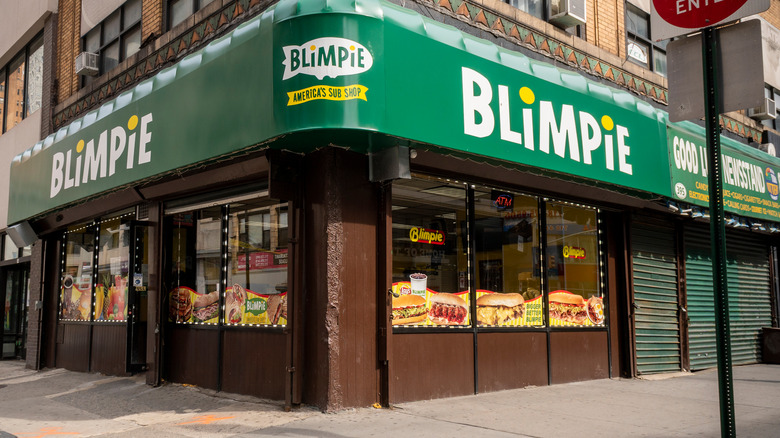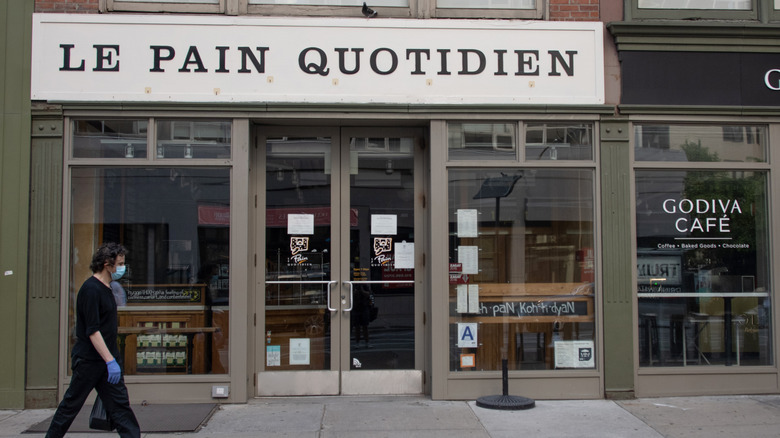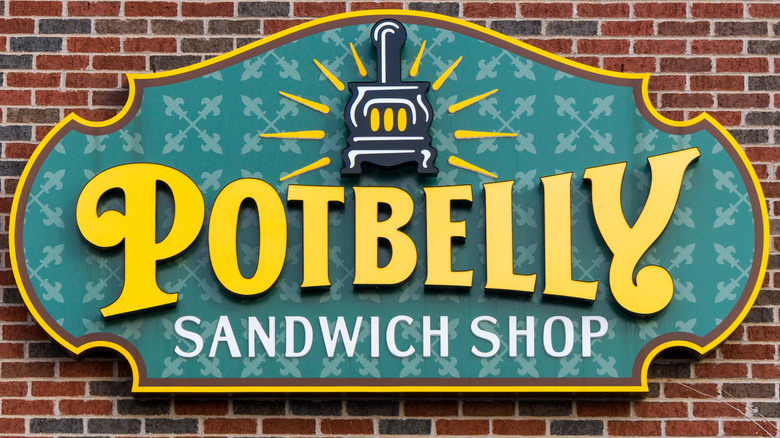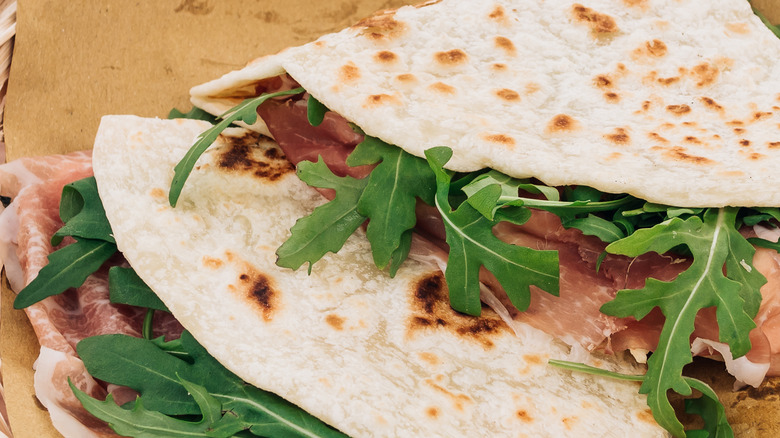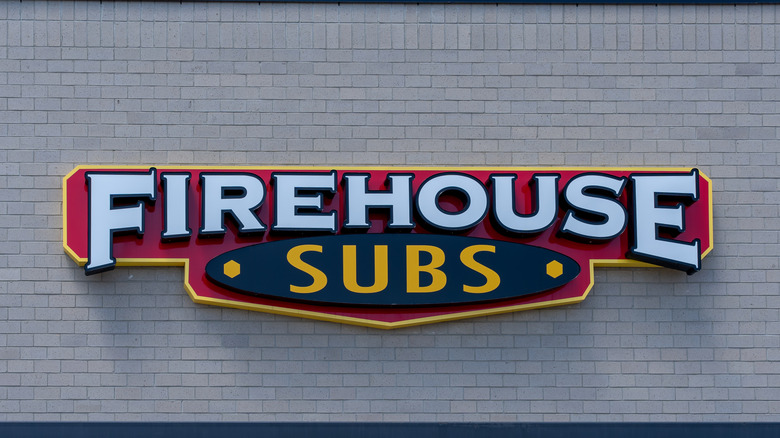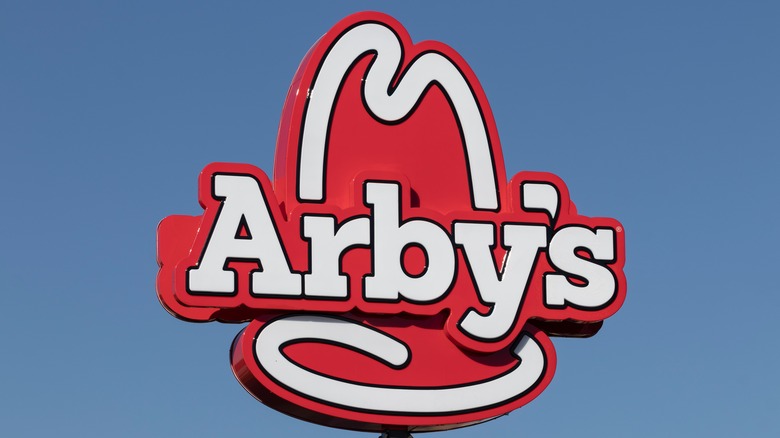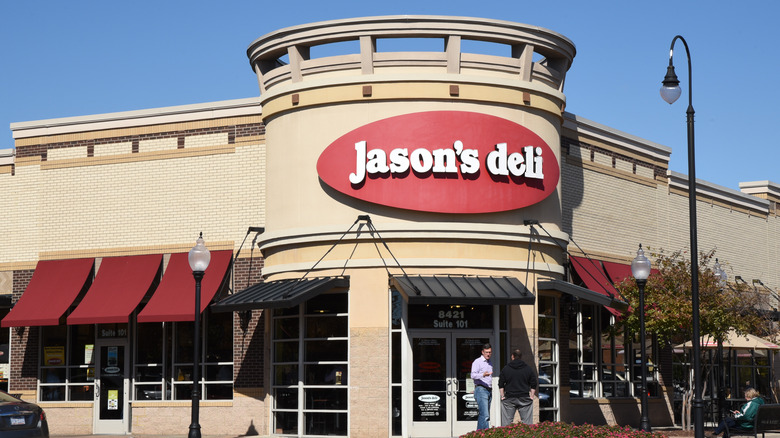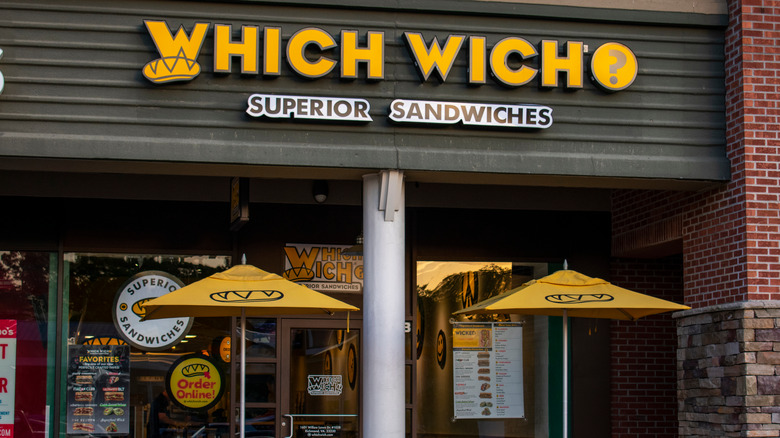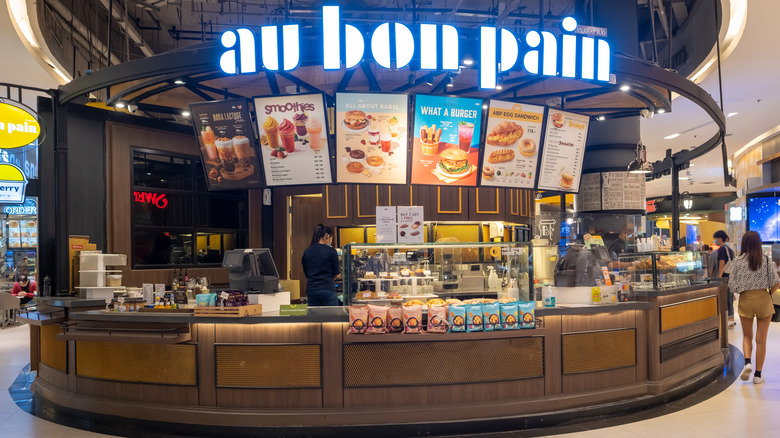12 Chain Sandwich Shops That Are Disappearing Across The Country
It's tough to keep a business open and profitable in normal conditions. Large chain sandwich shops have franchisees, customers across different markets, and vendors to keep happy. Add in labor shortages, a global pandemic, supply chain issues, and government-mandated shutdowns, and the past few years have been especially challenging for chain sandwich shops across the country. Specifically, shutdowns and the shift to telecommuting have hurt restaurants that serve traditional lunch items like sandwiches, as people are more likely to eat their lunch at home. According to the U.S. Bureau of Labor Statistics, the food services industry experienced a 71% decrease in demand during the pandemic. While some chains are faring better than others, most businesses have had to pivot to survive during these times.
Whether they're the best-known international sub sandwich chains or up-and-coming brands we love, chain sandwich shops are in real trouble. From Subway and Quiznos to Which Wich and Jason's Deli, here are some of the chain sandwich shops that are disappearing across the country.
1. Quiznos
Founded in 1981, Quiznos is known for its delicious toasted subs and its interesting TV commercials featuring the bizarre mascot known as the Spongmonkeys in the early 2000s. During a time when cold deli meat sandwiches were common, Quiznos stood out for its quality and flavor.
While the toasted sandwich chain grew for decades, its luck changed when economic conditions took a downturn. Restaurant Business reported in 2018 that from the height of its success in 2007 with 4,700 locations worldwide, Quiznos closed thousands of locations during the Great Recession and filed Chapter 11 Bankruptcy in 2014 (via CNN).
According to QSR, the sandwich chain faced lawsuits from franchises about strict purchasing policies and struggled when workers spent less on workday lunches during the recession. Many of its locations are in office buildings, so it relied on workers buying meals during lunch breaks. As the Denver Business Journal wrote in 2018, Quiznos was acquired by private investment firm, High Bluff Capital Partners, and is down to less than 300 U.S. locations today (via Scrape Hero).
2. Subway
Subway was founded in 1965 by Peter Buck and Fred DeLuca and started franchise operations in 1974. According to Restaurant Business, Subway captured 41% of the market for a limited-service sandwich chain and established market dominance alongside other fast-food concepts like McDonald's.
In 2015, the New York Times reported that the former Subway spokesman Jared Fogle pled guilty to sex acts with minors and child pornography distribution and got 15 years in prison. After the news about spokesman Jared Fogle's sex abuse investigation and incarceration, Subway's brand took a hit.
There were also other franchise concerns and low revenue per unit due to overexpansion, Subway closed 2,400 locations in 2021 as sales dropped by $210 million in the United States (via Business Insider). Since franchisors often own only a few stores, this can put them in a weaker position to withstand weak sales and brand scandals. As a result, more locations will likely close in the future.
If you or anyone you know has been a victim of sexual assault, help is available. Visit the Rape, Abuse & Incest National Network website or contact RAINN's National Helpline at 1-800-656-HOPE (4673).
3. Jimmy John's
Jimmy John's was founded in 1983 with a limited menu that included just four sandwiches on freshly baked bread. For decades, it slowly grew in the number of locations across the United States. QSR reported that sales grew from $780 million in 2010 to $2.1 billion in 2018, with an impressive 148% growth in the number of locations over nine years.
Like other sandwich chains during the pandemic, the chain struggled as its main business is around lunchtime for workers. Without the foot traffic from commuters and office workers, sales slumped.
Additionally, in February 2020, the FDA sent Jimmy John's a warning about e coli outbreaks related to its clover sprouts and cucumbers. Frank Yiannas, the Deputy Commissioner for Food Policy and Response at the FDA indicated that "Jimmy John's restaurants have been implicated in multiple outbreaks that have spanned the past seven years and impacted consumers in no fewer than 17 states. Jimmy John's has not demonstrated implementation of long-term sustainable corrections to its supply chain to assure the safety of ingredients used in its products."
4. Blimpie Subs & Salads
Blimpie, known as "America's Sub Shop," opened in 1964 in Hoboken, New Jersey, as one of the first sub sandwich chains. Over more than 50 years, the sandwich chain continued to grow in sales and name recognition. The chain started to face more challenges with increased competition within the sandwich space. According to USA Today in 2012, Blimpie closed 1,114 stores between 2001 and 2011. Its sales declined by 60.1%.
According to The Bristol Press, there were only 220 in the U.S. in 2020. Some franchisees noted high setup costs, ongoing fees, and tough restrictions as detriments to keeping stores open. Former franchisee Mike Bell told The Bristol Press that there was a limited amount of franchise marketing for a company that was once a market leader.
According to Franchising.com, Blimpie is taking significant action to try to boost its sales. The company is expanding into new markets, including Southeast Asia. It is also testing the waters for meat alternatives in its menu items, as well as adding new flavor options to service a wider customer base (via Vegnews). While some of these options are temporary as an experiment, the company is expected to keep several recipes and ingredient additions long-term.
5. Le Pain Quotidien
When the pandemic started, Le Pain Quotidien operated 98 locations across the United States. According to USA Today, 56% of the company's sales came from New York City, an area especially hit by the COVID-19 pandemic and its related shutdowns. During this time, the New York City area was described as the epicenter for the COVID-19 pandemic.
Prior to the pandemic, the chain was struggling financially and started plans to restructure its operations through bankruptcy. Because of the challenging conditions of the pandemic and the increased competition, it faced significant financial difficulties. As a result, Le Pain Quotidien filed Chapter 11 Bankruptcy in 2020 and all of its locations closed with that action.
According to Forbes, a new owner, Aurify Brands, relaunched 52 locations to keep the brand alive. It bought the Le Pain Quotidien for $5 million along with the 11 locations of the bakery chain Maison Kayser for $3 million. Aurify Brands launched the Le Pain Quotidien mobile app and reopened the Maison Kayer stores as Le Pain Quotidien locations in 2021. As of now, there are 59 Le Pain Quotidien locations, according to a representative of the company.
6. Potbelly Sandwich Shop
According to CNBC, Potbelly Sandwich Shop took out a $10 million Paycheck Protection Program loan from the U.S. government in 2020, before returning the funds because of outrage of large businesses taking funds aimed at helping small businesses. As a result of the pandemic, it closed around 25 restaurants (via Restaurant Business).
This is a big departure from just seven years earlier when the company completed its IPO in 2013. According to Forbes, the IPO intended to raise $75 million. At the time, Potbelly Sandwich Shop had shops in 18 states and overseas with a lot more potential to grow through franchising. Unfortunately, the company went in the other direction because of difficulties like the COVID-19 pandemic and a global recession.
It appears that the problems started before the IPO finished. Forbes reported that of the $75 million that was expected, at least $50 million was already flagged for a dividend payout and to handle existing debt rather than to fuel the growth of the company. Had that money gone toward growth and expansion or to reinforce the company, Potbelly may not have had to close its stores.
7. Cosi
Cosi is best-known for its delicious flatbread used in sandwiches and flatbread pizzas. The chain started in 1989 in Paris, before opening locations in the United States through franchise agreements. The restaurant chain became a public company in 2002. According to Inc., Cosi filed for Chapter 11 bankruptcy for the first time in September 2016 after it had not posted an annual profit since 1998.
According to the Chicago Tribune, Cosi filed bankruptcy for the second time in 2020. It continued to shutter its 30 closed locations throughout the earliest parts pandemic and even tried to apply for federal pandemic relief through the Small Business Administration's Restaurant Revitalization Fund.
According to Bloomberg Law, restaurants needed to have a court-approved bankruptcy plan in place before gaining access to funds. Cosi tried to have a Delaware bankruptcy court expedite approval of its reorganization plan but ultimately was rejected by the SBA and dismissed its case. The chain now seems to be more focused now on catering operations.
8. Firehouse Subs
Unlike many other national chain sandwich shops in the United States, Firehouse Subs grew in terms of same-store sales by around 20% when compared to pre-pandemic levels (via Reuters). Franchisees currently operate 97% of the brand's restaurants across North America. To survive the pandemic, it pivoted to takeout orders and closed its dining rooms, which required shifting staff roles and implementing new processes to keep staff and customers safe (via First Coast News).
According to Reuters, Firehouse Subs was acquired in November 2021 by Restaurant Brands International for $1 billion, as it struggled with closed dining rooms throughout the pandemic. Restaurant Brands International also owns Burger King, Popeyes, and Tim Hortons.
The change of leadership could present challenges for the sandwich chain, as the other brands that Restaurant Brands International owns aren't doing so well. Reuters reported that Popeye's U.S. comparable sales decreased by 4.5% in quarter three of 2021. If the other brands suffer too much, it could impact Firehouse Subs.
9. Arby's
According to QSR in 2011, Arby's suffers substantially during recessions, posting shrinking margins during the Great Recession. Arby's has a more expensive menu than other fast-food restaurants. Specifically, the QSR identified Arby's lack of a $1 menu as one of the drivers of poor performance for Arby's during economic recessions, as diners simply opt to eat somewhere that's more affordable.
Before the pandemic, the sales performance of Arby's had improved to post 10 years of positive same-store sales (via CNBC). It launched its first Latin American location in Guadalajara, Mexico in October 2020. While the opening was delayed due to pandemic disruptions, it did go ahead and open the restaurant: a sign of growth amid the risk.
Another economic downturn caused by the labor shortages and rising costs during the pandemic could adversely impact the company's ability to stay competitive. Its food is still priced considerably higher than other fast-food restaurants (via The Cold Wire). If post-pandemic economic conditions are poor, this could be a significant challenge for Arby's.
10. Jason's Deli
Jason's Deli, a deli chain founded in Beaumont, Texas, is incredibly popular with customers, and Insider reported that Jason's Deli is the most profitable deli chain with average sales exceeding $2,600,000 per unit in 2015. With such high profitability numbers, one can expect that Jason's Deli will survive the pandemic. However, it is seeing financial troubles just like everyone else.
According to Restaurant Business, Jason's Deli permanently closed around 10% (22 units) of its total restaurants as a result of the pandemic. The dip in profitability is putting pressure on the company to cut costs without changing the quality of its offerings. Several more locations are expected to close if market conditions do not change soon.
Speculation about the direction of the company has increased since the death of the founder. According to the Associated Press, Jason's Deli's founder died in 2019. Management new to the company is navigating the pandemic, which may contribute to the ongoing struggle to keep the company afloat. Fortunately, the company is continuing to expand with new locations being built in multiple Texas cities within the last six months, including San Angelo and Richardson.
11. Which Wich
Which Wich opened its first location in Dallas in 2003 and began the process of franchising in 2005. It's known for its unique number system where customers use markers to mark what they want to order on a paper sandwich bag.
Many Which Wich franchisors closed up shop during the COVID-19 pandemic as a result of financial distress and low foot traffic. This included its downtown Ann Arbor location in January 2022, the last of the original four locations in the Piedmont Triad region of North Carolina in August 2020 (via Triad Business Journal), and the downtown Iowa City location in August 2020 (Iowa City Press-Citizen).
According to Manisha Patel, the franchise owner of the Ann Arbor location, in an article for M Live, the decision to close the restaurant was related to labor shortages. Many businesses, especially those in the restaurant sector, are having trouble finding people to fill available positions. For sandwich chains located in downtown areas, the combination of staff shortages and lower foot traffic for lunch shifts as workers telecommute can be difficult to overcome.
12. Au Bon Pain
Au Bon Pain has a close relationship with another major brand, Panera. According to Baking Business, Au Bon Pain has 171 corporate locations as well as 131 franchise locations. All of these are now owned by AMPEX Brands, thanks to a recent sale of the company from one of Panera's subsidiaries.
According to Restaurant Business, AMPEX believes that the market will recover as the pandemic fades, leading to major growth opportunities. However, the company is struggling a bit thanks to the pandemic and is seeing sales decrease by up to one-third in a year and down 11% over the last five years.
Au Bon Pain is largely responsible for the growth of Panera, which was acquired by Au Bon Pain's founder before it was Panera. Years later, he sold Au Bon Pain to focus on growing Panera going forward, according to CNN Business. Panera repurchased Au Bon Pain in 2017, but is now re-selling the company to raise money to support other projects.
